Federal Budget a Success for Conservatives
April 29, 2015
Our latest nationwide polling explored several topics, which we will post over the next week. For this release, we look at feelings about the economy and the federal budget.
The Economy
The majority of those surveyed (56%) say the economy is in very good or good shape, compared to 44% who say poor or very poor. This is similar to perceptions measured at the beginning of the year. The deterioration that was evident in the period between October and January has stopped, for the moment anyway.
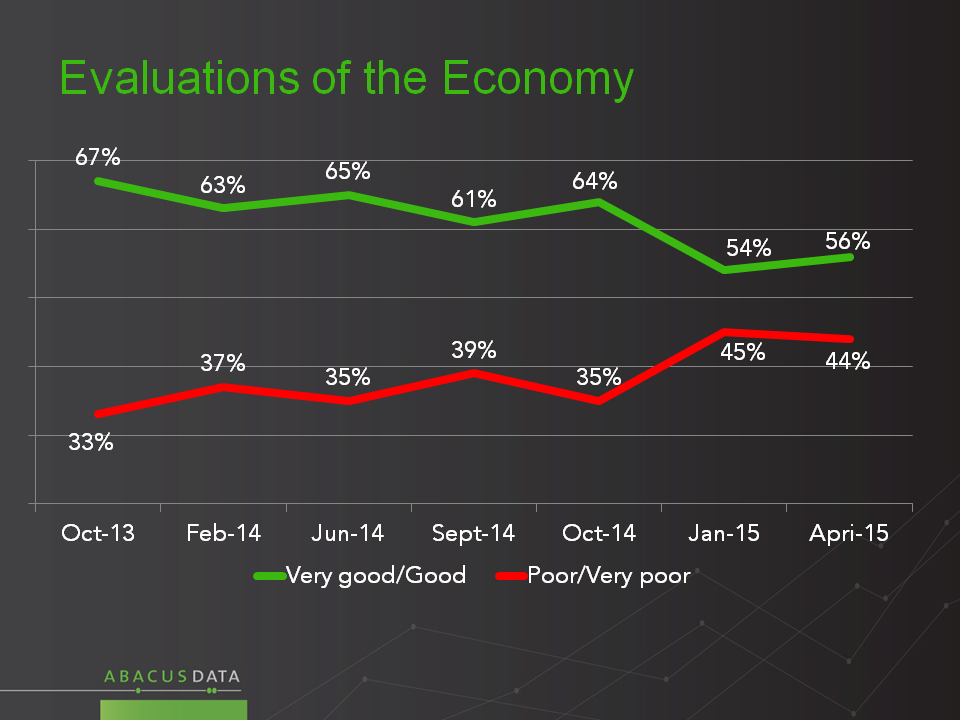
In terms of outlook for the near future, more people expect things to get better in the next six months (28%) than get worse (20%). This represents a sharp drop in the level of pessimism we found in January, where 34% believed the Canadian economy would get worse over the next six months.

Most (61%) of those who say the economy is in good shape believe that the government deserves some credit for that fact. Most (68%) of those who think the economy is doing poorly, 68% think the government deserves some blame for that fact.
In other words, 64% of voters consider the government responsible for the good or bad they seen in economic terms today: 34% overall think the economy is good and credit Ottawa, while 30% think the economy is poor and blame Ottawa.
The remaining voters (36% in total) 22% think the economy is doing well but don’t credit the government and 14% think the economy is doing poorly but don’t blame the government.
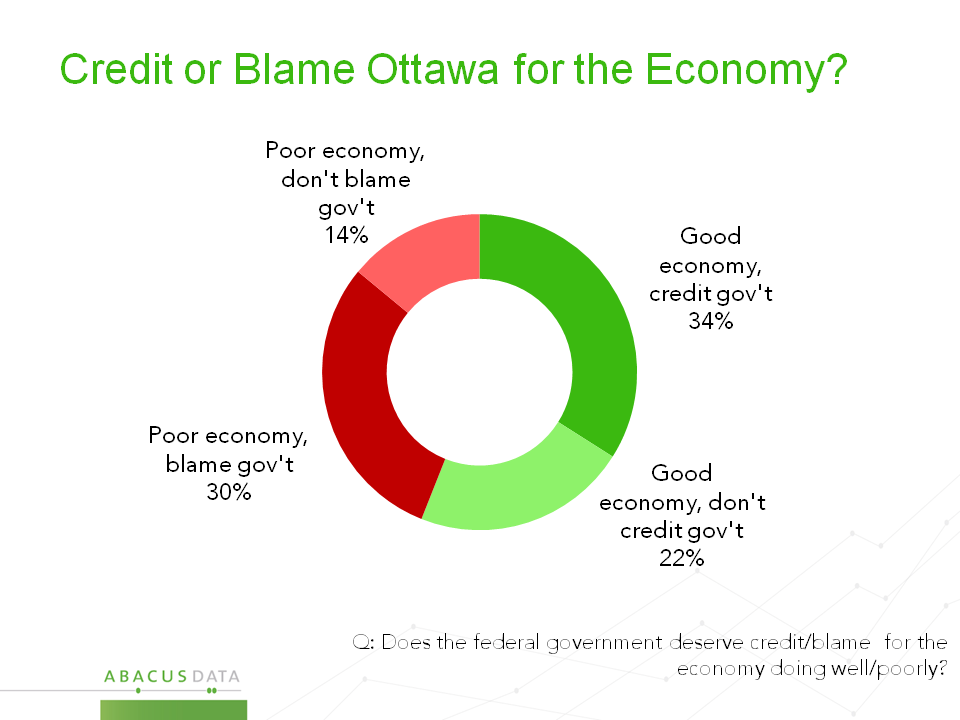

Worth noting is that almost half of NDP and Liberal voters think the economy is doing well, and only roughly 40% of their voters blame the Conservatives for poor economic conditions. This raises a question of whether the health of the economy is a fruitful issue for opposition parties to campaign on, given current public perceptions.
The Budget
The majority (61%) of those polled paid some attention to the budget, with 16% saying they followed it closely and 45% saying they knew the important details. 31% said they really only knew there was a budget, and 8% were unaware that there was a budget.

When asked about the effects of the budget, those familiar with the budget were more likely to say it would be good rather than bad for themselves and their family, and for Canada over the next five years. A large majority (70%) also agrees with the opposition argument that the budget will be good for wealthy Canadians.
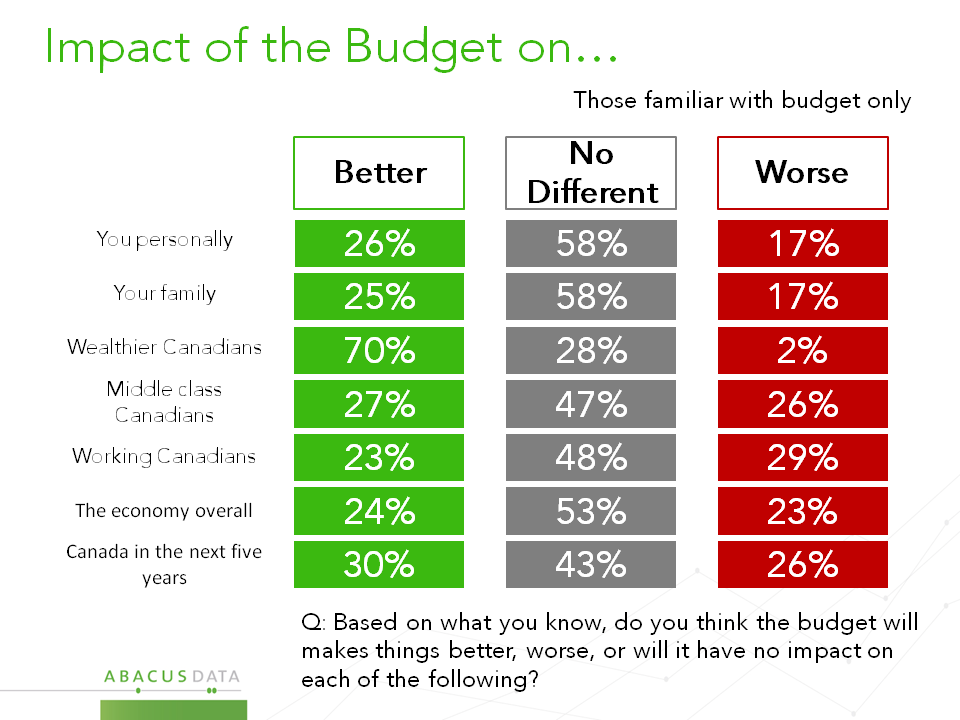
Worth noting in these results are three things: first, people clearly can believe that the budget is good for wealthy people without believing it is bad for themselves.
Second, there is a 9-point gap between how people think the budget will affect them, and how they see it affecting the “middle class”. For these voters, the key issue is likely their own situation rather than that of the middle class in general.
In recent years, budgets have tended to be polarizing documents, causing strong positive support among the government’s base voters and strong negative reactions among partisans of other parties. This budget appears to have caused less polarization. To that point, among those who say the budget will be good for them or for the country, one in four were supporters of the NDP or the Liberals in the last election.
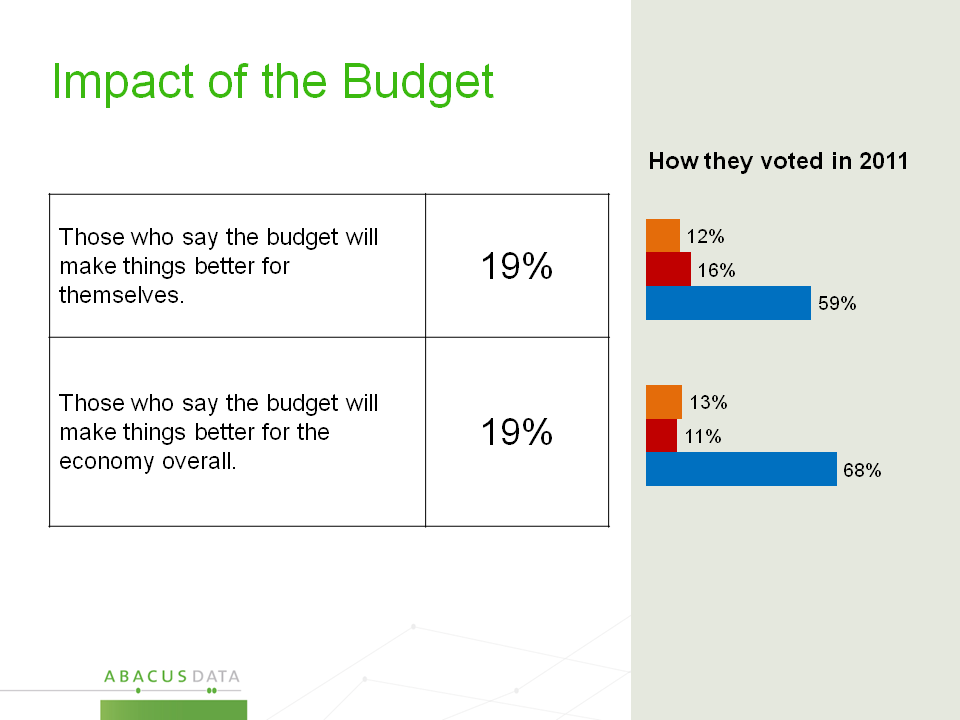
The budget has helped boost perceptions of the Conservatives as economic managers. Since our last wave of surveying voters who say that job creation, taxes, middle class incomes, and debt/deficits are the top issues facing the country all show higher levels of support for the Conservatives, in each case pulling support from the Liberal Party.
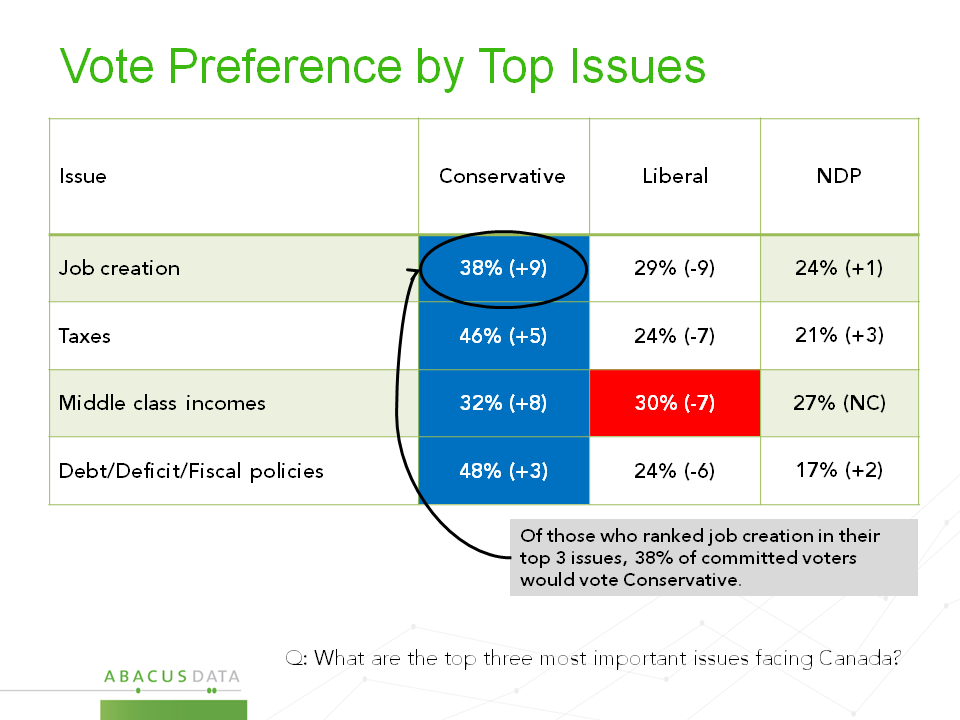
The Upshot?
This is one of the more positive polls for the Conservatives in some time. Pessimism about the economy is limited and has reduced lately. Most people think the economy is in reasonable shape and only a third of voters are angry with the government about the state of the economy.
Budgets are often highly polarizing, as parties in power make choices that create winners and losers, and partisanship and ideology are prominent. In this case, there is a positive reaction among the Conservative voters, and little frustration among voters inclined to support other parties. If the government wanted to position itself as less ideological and partisan, this budget helped.
For the opposition parties, the patterns are a signal that winning an election based on middle class anger with the economy will be no easy task, and that the Conservatives have a competitive message on that front.
Something we will explore a bit more with other results to come from this wave of research and in the weeks ahead is the role of government advertising in setting these trends.
More than a third (38%) of those polled in English Canada had seen a recent federal government ad about tax relief (an ad with the proviso “subject to Parliamentary approval”).
Methodology
Our survey was conducted online with 1,500 Canadians aged 18 and over from April 22 to April 24, 2015. A random sample of panelists was invited to complete the survey from a large representative panel of Canadians, recruited and managed by Research Now, one of the world’s leading provider of online research samples.
The Marketing Research and Intelligence Association policy limits statements about margins of sampling error for most online surveys. The margin of error for a comparable probability-based random sample of the same size is +/- 2.6%, 19 times out of 20. The data were weighted according to census data to ensure that the sample matched Canada’s population according to age, gender, educational attainment, and region. Totals may not add up to 100 due to rounding.

Abacus Data Inc.
We offer global research capacity with a strong focus on customer service, attention to detail and value added insight. Our team combines the experience of our Chairman Bruce Anderson, one of Canada’s leading research executives for two decades, with the energy, creativity and research expertise of CEO David Coletto, PhD.
In case you missed it, here are some of our recent releases:
Liberals and Tories Tied as Harper’s Negatives Rise
Niqabs, Hijabs, Anxiety and Accommodation
Canada’s mission against ISIL: What comes next?
Economic anxiety on the rise; Canadians want pragmatic policy making
Should carbon be priced? Should public opinion decide pipelines?




